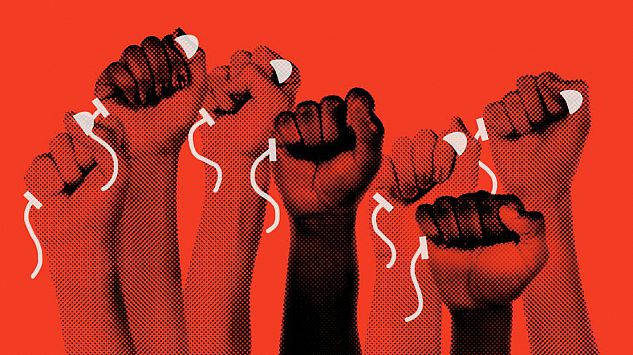by Karine Aasgaard Jansen (Chr. Michelsen Institute, Norway), Inga Winkler (Central European University, Austria), Maya Unnithan (University of Sussex, the United Kingdom) and Muthusamy Sivakami (Tata Institute of Social Sciences, India)
While we’re seeing a worldwide pushback against sexual and reproductive health rights (SRHR), mobilisation around menstruation is increasing. Why is that, and why does menstrual activism matter? Which possibilities and risks does this move from moment to motion entail? These are some of the central issues that we want to address with the initiation of a new collaborative research project focusing on menstrual justice and its importance for the realization of human rights.
 iStock
iStock
Very many of us have been there: Bleeding through at the most inconvenient time, followed by feelings of embarrassment and shame over a normal, healthy process that none of us can control. In various parts of the world, something seems to be stirring when it comes to periods, however. Beyond the individual bodily experience of menstruation, periods are increasingly becoming an issue for advocacy and mobilisation, but also for backlash:
In Nairobi, Kenya, Senator Gloria Orwoba discovered a bloodstain on her white pantsuit before entering Parliament earlier this year. She still chose to go in saying that she was making a statement against menstrual shaming. She was not allowed to stay for long before she was ordered by the Speaker to go change her clothes.
In Brasilia, Brazil, the Congress approved of new legislation to introduce a national menstrual health program in 2021. The bill, which was intended to combat period poverty by distributing free pads and tampons to disadvantaged girls and women including prisoners, homeless people, and teenage girls in state-run schools, was vetoed by President Bolsonaro. The veto caused a public outcry.
In Kerala, India, the Supreme Court lifted a century old ban on women of childbearing age to enter Hindu temples in 2019. The restriction was based on a religious notion of impurity applying to menstruating women and Dalit. When two women went into the Sabarimala temple to pray however, massive violent disruptions erupted. Political parties were deeply involved based on diverging ideologies which led hundreds of women to take to the street to form a human chain to demonstrate their support of the legal motion, and more broadly gender equality.
In Kampala, Uganda, medical anthropologist, poet, and activist Stella Nyanzi was imprisoned in 2017 for speaking out against Ugandan President Museveni, inter alia for not fulfilling his electoral promise to distribute free menstrual products to schoolgirls living in poverty. She was sentenced to 18 months for insulting the President and has been living in exile since 2022.
In Atlanta, US, Alisha Coleman was fired from her job as a 911 call taker in 2016 for bleeding through and staining the carpet at her workplace. While sudden onset of heavy menstrual flow is a common occurrence during perimenopause, the case was initially rejected in the district court by the judge who claimed that the termination of her employment was not based on sexual discrimination.
These are just a few well-known examples of how periods are political. People who menstruate are refusing to be stigmatized over staining, or to lose access to spaces because they are on their periods. Menstruation is no longer merely a girls’ and women’s issue, but also includes trans, non-binary, and gender non-conforming menstruators. To end period poverty, menstrual activists also demand removal of taxes and access to free menstrual products of their choice in all public bathrooms. To acknowledge, but also accommodate menstrual pain, menstrual leave is up for discussion in several countries, and was recently granted in Spain following Japan, South Korea, Taiwan, Zambia and other countries. In short: People who menstruate are claiming their rights to menstrual justice.
Yet, within global policy and health circles, especially those with a focus on development aid, menstruation has primarily been addressed as an issue of concern to public health. Periods have thus become a problem which is believed to be easily fixed through the provision of water, sanitation, and hygiene (WASH) facilities, and distribution of menstrual products to schoolgirls in low-income countries in the Global South.
While these efforts are important and should be recognized, they have nevertheless failed to address menstrual stigma as the underlying obstacle to the realization of human rights. Menstruation has thus remained outside of the contested domain of sexual and reproductive health rights (SRHR). Given the backlash against SRHR including access to contraception and abortion, there may be good reasons for this. In Florida, US, legislation dubbed the “Don’s say period” bill shows for example how menstruation is increasingly perceived as a sexualised topic among some conservative forces. The bill states that menstruation should not be addressed in schools until the sixth grade at the earliest. Given how many girls reach menarche before the age of 11 or 12, the passing of the bill will thus restrict girls’ access to adequate menstrual information and contribute towards furthering misconceptions and shame about periods.
But is this apolitical approach adopted by policy and health circles really the solution to avoid or counteract widespread pushback against SRHR?
As shown by the previous examples, menstruation was never apolitical in the first place. The question now is therefore whether menstrual activists will be able to push through and beyond the apolitical menstrual hygiene and health agenda. It is high time menstrual justice becomes a reality.

